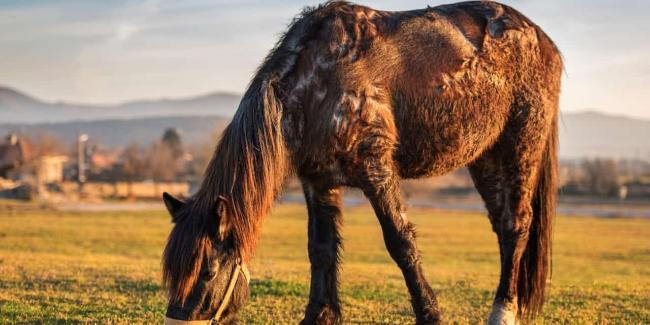Blue light may hold the key for improving coat condition in horses with PPID
Blue light may hold the key for improving coat condition in horses with PPID
Researchers at UCD have announced a collaboration with colleagues at the University of Kentucky’s (opens in a new window)Gluck Equine Research Centre for a large-scale study to investigate the effects of blue light treatment in PPID horses over a 12-month period. The research team is led by (opens in a new window)Dr Barbara Anne Murphy, Head of Equine Science within UCD School of Agriculture and Food Science, in close collaboration with Dr Amanda Adams at the Gluck Centre.

The UCD team are recruiting interest from owners of horses and ponies with PPID (Pituitary Pars Intermedia Dysfunction) that meet a specific set of criteria to investigate if blue light treatment can influence the symptoms of this debilitating condition of older horses – including both medicated (e.g. on Pergolide) and unmedicated horses and ponies.
PPID, also known as Equine Cushing’s disease, is a debilitating condition that affects one in five horses and ponies over the age of 15. It is characterised by the growth of an abnormally long and curly hair coat, termed hypertrichosis. In addition, the heavy winter coat frequently does not shed adequately in the spring. This can cause poor heat regulation which leads to sweating in affected horses, and some discomfort in hot weather or after exercise.
Results of a (opens in a new window)recent study lead by Dr Amanda Adams at the University of Kentucky suggested that blue light therapy may offer a potential treatment for reducing hypertrichosis in horses with PPID. The study found that PPID horses fitted with a blue light mask (Equilume) had lighter winter hair coats than untreated horses, and that hair coat growth was slowed. The use of blue light masks, which simulate daylight, artificially mimics a long summer’s day. More research is needed to confirm this finding, and also to evaluate other potential benefits for PPID horses of extending daylight using blue light.
Dr Barbara Murphy commented: “We are excited about this important study, especially given the recent results from the University of Kentucky suggesting that blue light could help reduce some symptoms of PPID. We are hoping for a big response from owners of PPID horses and ponies so that we get the numbers we need for a thorough investigation.”
Dr Amanda Adams said: “One of the goal's of my research programme at the Gluck Center is to help owners help horses with PPID. I reached out to Dr Murphy a few years ago with the novel idea of using the blue light mask as a way to extend day length and potentially modulate the biological response in PPID horses, both as a means to help us understand more about PPID and help manage the clinical symptoms. Our recent study results are promising, we just need to conduct this study on a larger scale and that's exactly what this collaboration is aiming to do."
The study will help researchers and veterinarians to better understand PPID as a disorder of older horses, and evaluate the impact of blue light at alleviating some symptoms of the disease.
Owners or managers of horses or ponies diagnosed with PPID which display hypertrichosis (long curly hair coat) can complete a (opens in a new window)short questionnaire to see if they are eligible to participate. Both medicated (e.g. Pergolide) and unmedicated horses and ponies are suitable.
All selected participants will receive an Equilume Cashel blue light mask at the beginning (treatment group) or at the end (control group) of the study (which represents treatment worth €700/$700). The study requires the monthly collection of hair samples from participating horses and ponies, submission of photographs and the completion of bi-monthly online questionnaires. Participant applications will be accepted until Friday, 22 October 2021.
Suitable participants will be randomly assigned to either treatment (fitted with an Equilume light mask) or control (no additional light exposure) groups. The control group is as important as the treatment group and will allow the collection of valuable data related to the seasonal changes in symptoms of PPID horses.
The data collected will contribute significantly to knowledge of how PPID horses’ coat condition is affected throughout the year, and the results will help with the future management of this important condition.
What is PPID?
Pituitary pars intermedia dysfunction (PPID; equine Cushing’s disease) is an endocrine disorder that occurs in over 20% of aged horses, ponies, and donkeys. Most animals are over 15 years old when diagnosed, but PPID can occur in younger horses. It is rare in horses less than 10 years old. Horses and ponies of any breed may be affected.
How does PPID affect equines?
The pituitary gland, located at the base of the brain, plays a key role in regulating the body’s hormones. Many metabolic and reproductive functions, as well as blood pressure and electrolyte balance are affected. Horses develop enlargement and benign tumors in a section of the pituitary gland known as the pars intermedia. While these tumors do not spread and rarely become large enough to cause neurological disease, they overproduce hormones that create an abnormal metabolic state.
One of the main hormones that increases is adrenocorticotropic hormone (ACTH). This can cause many problems, including delayed shedding (ranging from a few long hairs to a distinctly long and wavy coat), muscle wasting (especially over the topline), weight loss, increased thirst and urination, either sweating or an abnormally dry coat, behavior changes, reproductive abnormalities, and frequent infections due to immune system suppression. While symptomatic treatment can address some signs (for example, a long hair coat can be managed by body clipping), the combined problems often lead to debilitation and reduce an older horse’s quality of life. Affected animals struggle with dental disease, chronic sinus and skin infections, intestinal parasites, and general ill thrift. More severe metabolic problems may occur if they develop other disorders (such as colic, diarrhea, or pneumonia), complicating their treatment.